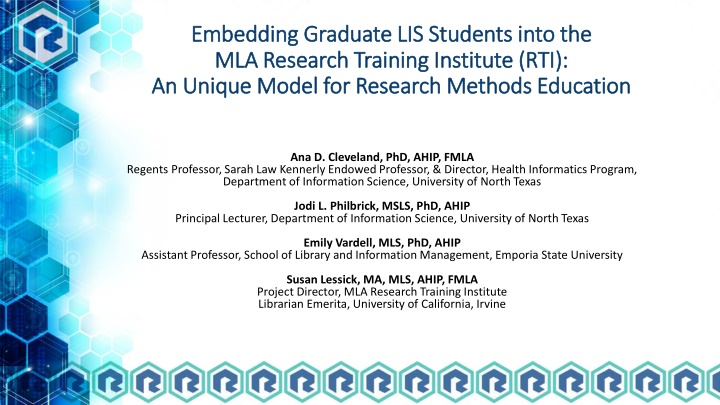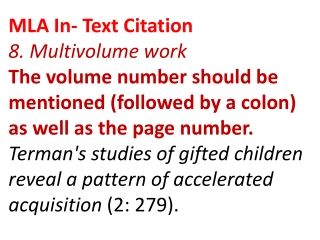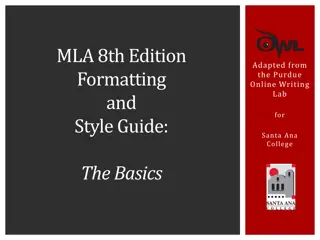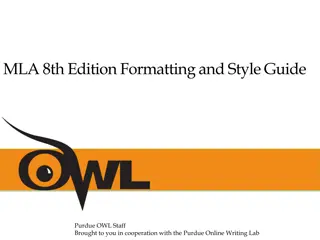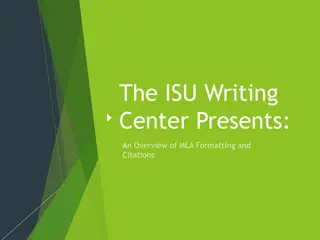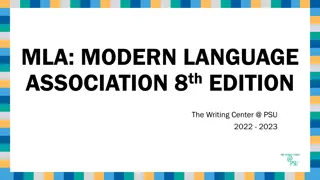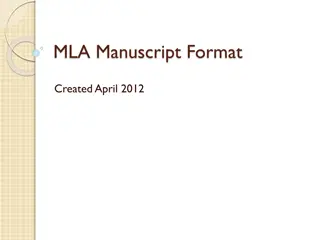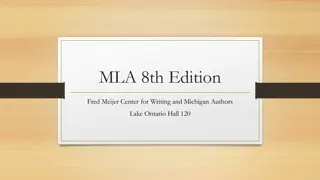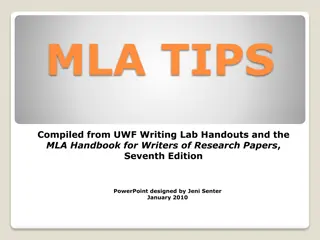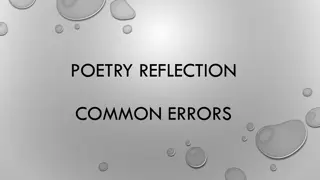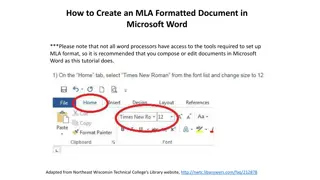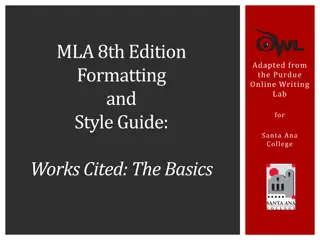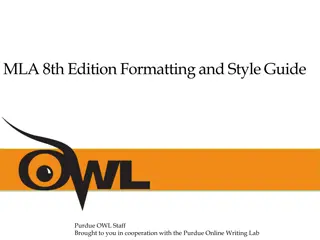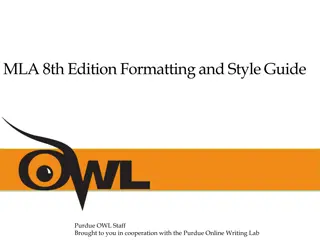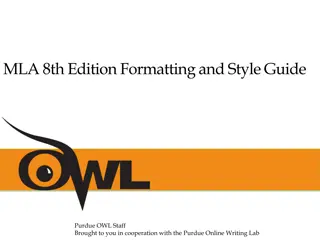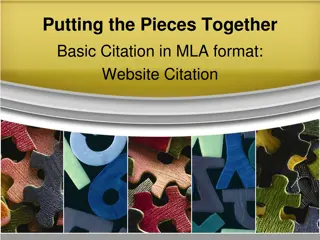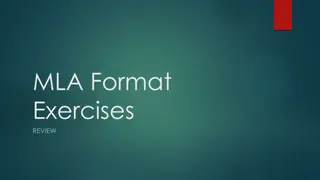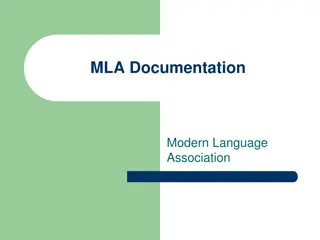MLA Research Training Institute: Advancing Research Methods Education
"Explore the innovative model of the MLA Research Training Institute for embedding graduate LIS students, enhancing research competencies, and building capacity for impactful health and library improvements. The program spans cohorts, online modules, mentoring, and a unique Embedded Graduate Student Program, fostering research quality and dissemination."
Download Presentation

Please find below an Image/Link to download the presentation.
The content on the website is provided AS IS for your information and personal use only. It may not be sold, licensed, or shared on other websites without obtaining consent from the author.If you encounter any issues during the download, it is possible that the publisher has removed the file from their server.
You are allowed to download the files provided on this website for personal or commercial use, subject to the condition that they are used lawfully. All files are the property of their respective owners.
The content on the website is provided AS IS for your information and personal use only. It may not be sold, licensed, or shared on other websites without obtaining consent from the author.
E N D
Presentation Transcript
Embedding Graduate LIS Students into the Embedding Graduate LIS Students into the MLA Research Training Institute (RTI): MLA Research Training Institute (RTI): An Unique Model for Research Methods Education An Unique Model for Research Methods Education Ana D. Cleveland, PhD, AHIP, FMLA Regents Professor, Sarah Law Kennerly Endowed Professor, & Director, Health Informatics Program, Department of Information Science, University of North Texas Jodi L. Philbrick, MSLS, PhD, AHIP Principal Lecturer, Department of Information Science, University of North Texas Emily Vardell, MLS, PhD, AHIP Assistant Professor, School of Library and Information Management, Emporia State University Susan Lessick, MA, MLS, AHIP, FMLA Project Director, MLA Research Training Institute Librarian Emerita, University of California, Irvine
Overview of MLA Research Training Institute Overview of MLA Research Training Institute Cohort 1 Cohort 2 2018 2019 Cohort 3 2019 2020 20 fellows Cohort 4 2020 2021 20 fellows 5-day institute at UIC Cohort 5 2021 - 2022 5-day institute at UIC 20 fellows 2022-2023 32 fellows 5-day online institute 32 fellows Online with 16 modules Online with 16 modules Funded by 3-year IMLS Laura Bush 21st Century Librarian Grant Funded by MLA Funded by 3-year IMLS Laura Bush 21st Century Librarian Grant
Goals of MLA Research Training Institute Goals of MLA Research Training Institute Increase research competencies Increase research quality, quantity, and dissemination Build research capacity to contribute to health and library improvements
Features of the Features of the 2021 2021- -2022 Online Research Training Institute 2022 Online Research Training Institute One-year institute that includes: 1. 16 synchronous learning modules and asynchronous learning content & activities covering all stages of designing, implementing, and publishing a health information research project 2. Mentoring & check-in points throughout the year 3. Peer coach support program 4. Online community of practice 5. Capstone presentation at MLA Annual meeting + Embedded Graduate Student Program!
Embedded Graduate Student Program Embedded Graduate Student Program Pilot research methods education project for graduate students from UNT and ESU Serves as a model for other master s programs to improve the quality of research methods instruction.
Academic Partners Academic Partners
Structure of the Embedded Graduate Student Program Structure of the Embedded Graduate Student Program MLA Leadership Team & Project Director 6 6 RTI Faculty 5 Peer Coaches Student Fellows (5 Primary Mentors) 2 Academic Liaisons
Unique Features for Graduate Students Unique Features for Graduate Students Students receive both advanced research methods instruction and hands-on experiential learning activities Students receive academic credit for their participation in the RTI Academic liaisons from each university meet individually with students about their progress; progress report filed with co-lead faculty and project director Small group meetings with students, academic liaisons, and project director outside of regular RTI sessions
Small Group Meetings Small Group Meetings Date Discussion Topics June 3, 2021 Student introductions Purpose of students meetings June 29, 2021 Evolution of research topic since starting RTI Main challenges in conducting research What surprised you most since starting RTI August 3, 2021 Final research topic in 30 seconds or less First 3 items on the to-do list Communication plan with mentors September 14, 2021 Progress on research projects Next item on the to-do list Balancing coursework with the RTI November 9, 2021 Progress on research projects Benefits from the RTI experience Lessons learned from the research process
2021 Graduate Student Fellows Curtis Kennett Mary Catherine Ellis Carmela Preciado E. Bailey Sterling Topic: Depression and LIS Training: A Cultural Consensus Analysis of Depression Within Texas LIS Programs Topic: Perspectives of First- Generation Immigrants Access to Healthcare in Central Texas Topic: A Content Analysis of Online Autism Health Information Topic: Board Games as Effective Disaster Information Literacy Tools for Children Mentor: Mark MacEachern Peer Coach: Robin O Hanlon Mentor: Mark MacEachern Peer Coach: Robin O Hanlon Mentor: Emily Vardell Peer Coach: Natasha Williams Mentor: Katherine Akers Peer Coach: Laura Menard
2021 Graduate Student Fellows Andrea Dater Mary Margaret Thomas Topic: Understanding the Institutional Review Board Submission Process: A Content Analysis of IRB Submission Forms of RTI Participants, 2018-2020 Topic: Mental Health First Aid (MHFA) Training: A Librarian s Perspective Mentor: Jodi Philbrick Peer Coach: Hilary Jasmin Mentor: Shanda Hunt Peer Coach: Ying Zhong
What Weve Learned So Far What We ve Learned So Far Student fellows have gained confidence in two areas: Their own research ability Interacting with non-student fellows in the RTI (practicing health sciences librarians) Student fellows have benefited from the interaction with each other Students have learned the benefits of research collaboration and engagement with other students Student fellows have learned about the practicalities of doing research Access to population/sample IRB process Time management
Comments/Questions? Comments/Questions? For additional information about RTI: RTI web site MLANET, under Professional Development link at top of page http://www.mlanet.org/p/cm/ld/fid=1333 Contact Us: Ana D. Cleveland (ana.cleveland@unt.edu) Jodi Philbrick (jodi.philbrick@unt.edu) Emily Vardell (evardell@emporia.edu) Susan Lessick (slessick@uci.edu) This project was made possible in part by the Institute of Museum and Library Services (RE-246568-OLS-20).
